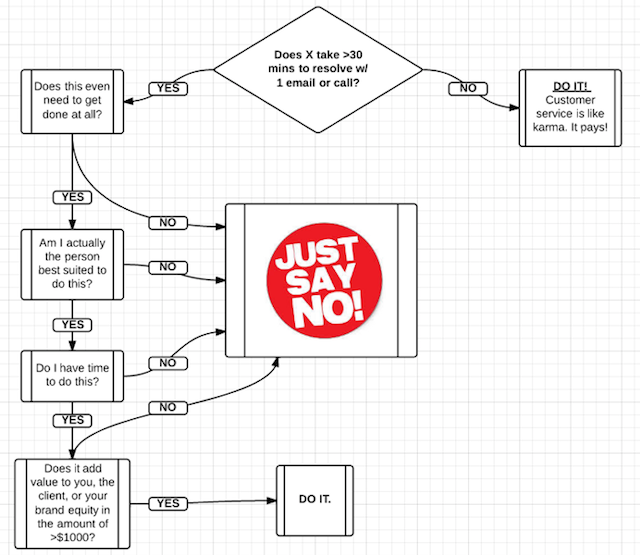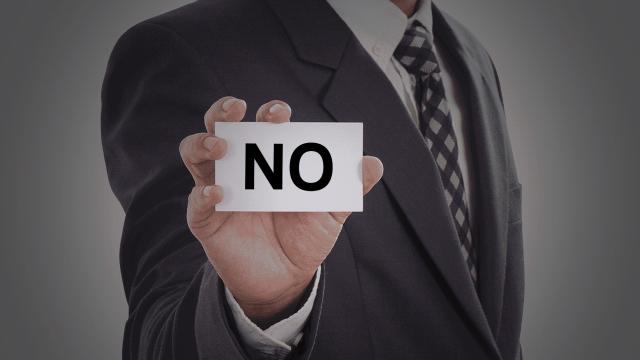At work and at home, it’s easy to say “yes” so often you forget what you’re saying “yes” to. Learning how to say “no” is a powerful skill. Author Scott Fetters explains why you should say it more often (and how to get better at it).
This post originally appeared on Medium.
This is not a story for haters. It’s not a call to arms, or a cue to be an a**hole. I am advocating on behalf of “Mr No”, but I’m in no way suggesting you should deny yourself amazing life experiences. This post is about personal development. About working to quiet the people pleaser residing within, so we can try to be impeccable with our word.
Over the last one or two years, I realised my people pleasing tendencies were creating stress and inefficient production cycles. Thanks to my stern business partner, and simple exercises in saying “no”, I’ve begun to preserve my most valuable resource while growing personally and professionally.
The Habit of People Pleasing Is Debilitating
Hustling for the last eight years in the tech space, I’ve signed up for a lot of ways to waste time. With our ever-connected social and digital lives, opportunities to please people’s every whim loom on every backlit screen. All it takes is one beep, ding, ping, alert or ringtone to outflank your productivity. Emails, instant messages, Facebook, texts, calls, voicemails, Basecamp, CRM notifications, tweets. The list is never ending.
I know everyone simply says, “Just turn them off. Don’t open email. Focus, blah, blah, blah.” Here’s the deal: that works for a few hours, but it’s inevitable you’ll receive the message. When you do, it’s all about how you respond that counts.
Example Distractions and People Pleasing Reactions
- Email / Text / IM: “URGENTLY NEED YOUR HELP on this totally unrelated task!” Well, business coaching isn’t my current speciality but it sounds like they could really use some advice. Why not?
- Useless Meetings / Appointments: “This face-to-face meeting has no objective but it’s obviously the one meeting to rule them all.” It’s only going to take an hour. It’s networking. Maybe we’ll leave with action items and they’ll come to us when they have a budget?
- Excuses : “I got in a car accident. My office had an impromptu fire drill. I have to pass a kidney stone. My pet goldfish Nemo desperately needs a walk.” Hmmm… There must be some real sh*t going on in this person’s life, let’s give them another 24 — 48hrs to deliver.
- Events :“Don’t miss this extraordinary, once in a life-time, all day conference. This networking opportunity only happens every blue moon.” Ya know, maybe there will be some business we can drum up?
- Feature + Scope Creep:“X is the coolest new thing I just read about on some blog. We totally need it. It shouldn’t take much time to build this easy feature, right?” Yes Sir, we can definitely, probably, almost certainly get that done for you. Wait, what?
- Client Management:“This project is super intense. It requires daily / weekly 2 hr status calls.” The client is probably right and come to think of it, they are paying a lot of money. We pride ourselves in customer service so let’s just make them happy
Do not fear /”the no.” It may seem like a powerfully intimidating two letter word. But for such a tiny word, “no” is profoundly liberating. When you decide, “this does not warrant my immediate attention, or this is counterproductive we’re not doing this” you embrace your intuition.
If at any point you’ve already thought about saying “no” to something, there’s probably merit for consideration. Saying “no” is your battle shield for deflecting distractions, staying true to yourself, and sticking to the course. Every time you agree to do something you do not believe is right, or want to do, it beats you up mentally. I know firsthand. People like to see progress. To create. The creative process is handicapped when you are playing dodge ball with bullshit you wish you had never committed to. Trust your gut — your brain will thank you.

The Solution
This may sound like a disconnect, but I’ve found it’s all about effective communication. People will eventually respect you for disagreeing with them. Saying “no” is not the equivalent of flipping a giant middle finger. It’s quite the opposite. It shows you have a vision, a plan, and an opinion. By clearly articulating your needs, challenges, or deadlines (in advance if possible) you begin to eliminate distractions. In turn, you stop feeling inclined to people please because you have defined a game-plan.
An example from my professional life which has directly increased our company’s revenue on several projects relates to scope creep. Our statements of work (SOWs) have iterated maybe 10 — 15 times in the last two years to be more air tight. However, every client wants more than you agree to in an SOW. It’s inevitable as projects evolve, but free work doesn’t pay bills and it depletes your resources. Saying “no” helps me position clients for valuable repeat business opportunities, enables us to adhere to the original plan, and manage project expectations. In the end, a single no pays dividends.
People pleasing kills production. It can create a guilty inner demon who laughs at you for agreeing to stuff you know is a waste of time. Saying no, when thoughtfully structured, creates new business opportunities, shows you’re in control of the situation, and ensures projects actually see the light of day.
It also makes you feel really good.
Say “NO” More [Medium]
Scott Fetters is a copywriter and Facebook marketing consultant working with startups and Fortune 500 clients to boost revenue through clever content and paid ads. He’s also a co-founder of ProjectNominate and High Five Digital. Follow Scott on Twitter @_scottish_.

Comments